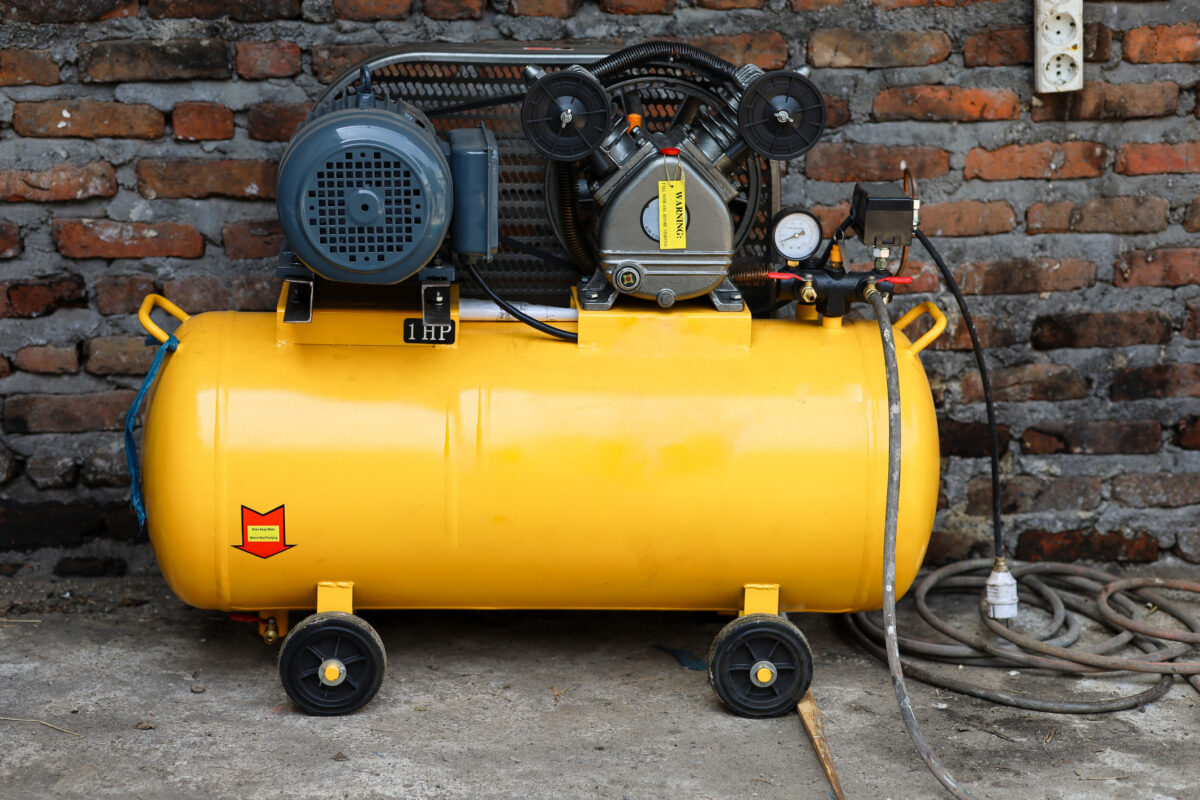Jump To:
What is a Compressed Air Audit?
Have you wondered how much power your air compressor is using? Or if it’s working as efficiently as it could be? These are the types of questions that can be answered with an air compressor audit.
A compressed air system is an intricate setup that includes dryers, filters, pipes, storage tanks, motors, and more, all working together to deliver compressed air where it’s needed. But, like any complex system, it needs regular check-ups to ensure it’s running at peak performance.
This is where a compressed air audit provides a thorough health check for your system. An audit analyzes your setup, checking everything about your compressed air system, from air usage and pressure readings to energy consumption and energy efficiency. In addition to identifying problems, a major piece of a comprehensive audit is finding opportunities to make your air system more efficient, reducing energy costs, and power consumption, and even improving your system’s operational reliability.
What Happens in an Audit
A typical compressed air audit requires one week or less of onsite time and consists of the following procedures:
1. Perform a Comprehensive Site Survey
Before you can conduct a compressed air audit, you need to understand your system and the equipment that comprises it. A site survey performed by a professional with extensive compressed air expertise will yield the most reliable results. This knowledgeable individual can determine if you’ve placed your compressors properly and assess the overall system dynamics.
2. Check for Leaks and Other Issues
As air compressor leaks are a primary culprit of excess energy consumption and associated higher costs, checking for them should be a top priority on any compressed air audit checklist.
3. Examine Air Filters
Air filters perform the crucial role of preventing contaminants from entering the unit. Over time, dirt, oil, and debris can clog the filters, allowing poor-quality air to pass through the system. Consequently, the equipment will need to work harder to deliver pressurized air on demand. An audit should include checking all filters and recommending cleaning or replacements as needed.
4. Detect Artificial Demand
Artificial demand occurs when a compressed air system operates at a higher pressure than necessary, typically to compensate for leaks or flow fluctuations. This extra demand causes the compressor to work harder, resulting in energy waste and increasing the risk of equipment damage. Compressed air audits can determine if artificial demand exists, and recommend the most reliable and cost-effective solution to ensure your compressors function at the lowest possible pressure point without affecting system performance.
5. Assess Air Dryer Compatibility
Dryers perform the critical function of cooling the air and removing moisture. However, to get the full benefit from your air dryer, it must be compatible with your air compressor. Otherwise, you’ll end up wasting money by using a dryer that has to work too hard or perform a task that doesn’t meet its functional requirements. A knowledgeable auditor can determine if you’re using the best equipment for your facility’s unique compressed air system configuration and make recommended upgrades if necessary.
6. Evaluate Storage Capacity
The more compressed air your system can store, the less frequently your compressors will need to operate. The result is more efficient equipment that lasts longer and requires fewer repairs and substantial cost savings for your business. An audit can determine if your compressor’s tanks provide sufficient storage capacity for your applications. If not, there are several options for increasing it. For example, it may be possible to couple two tanks to create a larger reservoir. If the compressor is a reciprocating unit, the air produced by the piston can flow through a connected tube into the tanks.
7. Optimize the Operating Schedule
Many companies fall into the habit of running their air compressors when they don’t need them. Some even leave them on during weekends or other times when the facility is empty. The simple step of shutting down compressors during off-hours can result in substantial energy savings and reduce the burden on your equipment.
8. Implementation
Compressed air audits offer little value if the company doesn’t implement the auditor’s recommendations. It’s important to develop a strategy for making upgrades cost-effectively and you should also schedule a follow-up audit after making the changes to assess their effectiveness.
How to Conduct an Audit
A typical analysis takes one week or less of onsite time and consists of the following procedures:
- Asses Supply Equipment
- Evaluate Storage Capability
- Determine Air Demand
- Address Production Issues
- Create System Diagrams
- Determine Operating Expenses
- Create Action Plan
- Deliver a Comprehensive Report
The process of executing an audit consists of the following steps:
1. Perform a Detailed Site Survey
Understanding your compressed air system and its components is essential. A professional with in-depth knowledge of compressed air systems will conduct this survey to see if the placement of a compressor is optimal and assess system dynamics.
2. Identify Leaks and Address Issues
Since leaks significantly contribute to unnecessary energy consumption and costs, identifying and fixing them is a crucial aspect of any compressed air audit.
3. Inspect Air Filters
Air filters are vital for preventing contamination. Over time, they can become clogged, leading to inefficient system operation. The audit process should include a thorough inspection of filters, with recommendations for cleaning or replacement as needed.
4. Detect Artificial Demand
Artificial demand, created when systems operate at higher than necessary pressures, often compensates for leaks or fluctuations, wasting energy and risking equipment. Audits should pinpoint any artificial demand, suggesting solutions to minimize pressure without compromising performance.
5. Evaluate Dryer Compatibility
Ensuring that your air dryer is compatible with your compressor is critical for removing moisture efficiently without overworking the equipment. During the audit, an expert should assess system compatibility and suggest upgrades if needed.
6. Assess Storage Capacity
Adequate storage reduces the need for constant compressor operation, enhancing efficiency and longevity while saving costs. An audit should evaluate if the current storage is adequate and explore options for expansion if necessary.
7. Optimize Operating Schedules
Unnecessary operation of compressors, especially during downtime, can lead to wasted energy. An audit can provide a strategy to shut down equipment when not in use which can yield significant savings.
8. Implement Recommendations
Compressed air audits do very little if the company doesn’t implement the recommendations. It’s important to develop a strategy for making upgrades cost-effectively and you should also schedule a follow-up audit after making the changes to assess their effectiveness.
Understanding the Importance of a Compressed Air Audit
The process of performing an air compressor audit involves using advanced tools to measure system performance, identify any problems, and find opportunities to improve your system efficiency. Here’s why an audit is an indispensable tool for your operations:
Identifying Inefficiencies in Your Air System
During an audit, technicians will focus on identifying inefficiencies that are often invisible to the naked eye. These inefficiencies could be anything from leaks in the system, improper use of compressed air, over-pressurization, and more, all of which can contribute to higher operational costs and reduced system lifespan. By pinpointing these areas, an audit can outline specific steps to streamline operations, ensuring that every ounce of compressed air is used as effectively as possible.
Finding Parts of Your System That Need to Be Repaired
Over time, wear and tear on your compressed air system can lead to parts needing repair or replacement. An audit identifies any components that are underperforming or on the brink of failure. This proactive approach not only saves you the hassle and cost of emergency repairs but also extends the overall life of your system by ensuring that all parts are in top working condition.
Identifying and Preventing Potential Machine Malfunctions
Perhaps one of the most significant advantages of a compressed air audit is its ability to forecast and prevent potential machine malfunctions. By analyzing the system’s current state and performance, an audit can predict issues that might lead to downtime in the future. This foresight allows you to address problems before they escalate, keeping your operations smooth and reducing the risk of unexpected halts in production.
Providing Opportunities to Improve Your System
Beyond troubleshooting, a compressed-air audit opens the door to improvement opportunities. It might reveal ways to enhance your system’s design for better airflow or suggest the integration of more advanced equipment to boost efficiency. These recommendations are tailored to your specific operations and system and significantly increase the overall effectiveness of your operations.
The Benefits of a Compressed Air Audit
Here’s a closer look at the benefits of conducting a compressed air audit for your facility:
Energy Savings
By pinpointing where and how energy is being wasted—whether through air leaks, over-pressurization, or inappropriate use of compressed air—an energy audit can outline actionable steps to rectify these issues. The result? Significant energy savings and a noticeable reduction in operational costs. This not only makes your operation more eco-friendly but can also boost your bottom line.
Potential Savings and Cost Reductions in Operating and Maintenance Costs
These audits can reveal ways to optimize maintenance routines, reduce wear and tear on equipment, and extend the lifespan of your compressed air system. By implementing the recommendations from an audit, you can enjoy lower operating costs and improved system performance, contributing directly to your facility’s financial health and operational efficiency.
Increasing System Reliability, Longevity and Performance
The longevity and performance of your compressed air system are closely linked to its maintenance and operational efficiency. A comprehensive audit identifies potential issues before they escalate into costly repairs or replacements. By proactively addressing these areas, you can understand the overall health of your system, ensuring it operates reliably and supports consistent production processes and quality outputs for longer periods.
Less Down Time
A compressed air audit can forecast potential system failures and allow for preemptive action to be taken. By identifying and rectifying issues before they lead to system breakdowns, audits significantly reduce the likelihood of unexpected downtime, keeping your operations running smoothly.
How Advanced Air & Vacuum Can Help
The complexities of maintaining an optimal compressed air system are no small feat, but Advanced Air & Vacuum is here to provide unparalleled support!
Using years of industry experience, we cater to nearly every recognized brand in the market, eliminating the burden of navigating these challenges on your own. Our suite of air compressors and services, coupled with our in-depth knowledge, makes us the go-to source for all your compressor needs. We specialize in compressor installation, repair, and maintenance, and our team of technicians is equipped to provide the guidance and solutions you require. For expert advice or to explore how our services can enhance your compressed air system’s performance and reliability, don’t hesitate to contact us or give us a call.

